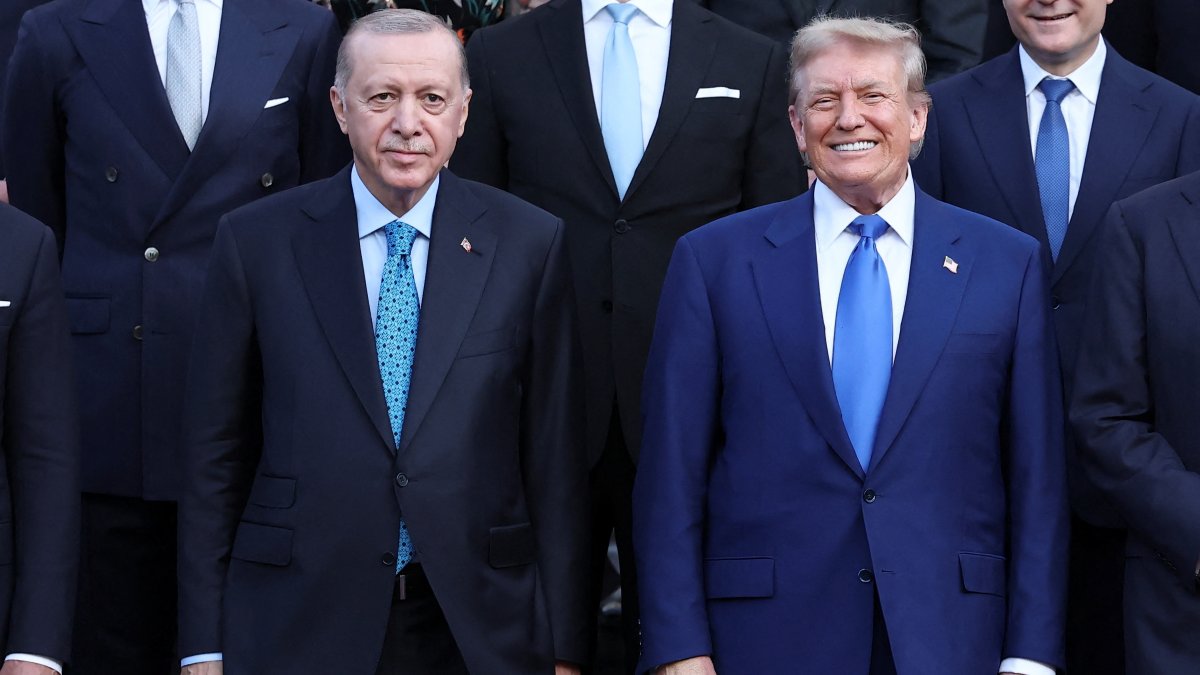U.S. President Donald Trump and Turkish President Recep Tayyip Erdoğan underscored the importance of reinforcing NATO’s deterrence and alliance unity during a bilateral meeting on the sidelines of the NATO summit in the Netherlands, amid ongoing geopolitical tensions and fresh efforts to sustain a cease-fire between Israel and Iran.
Trump, who has previously faced criticism for suggesting that U.S. support for NATO allies might depend on their defense spending, struck a more conciliatory tone at the summit, saying, “I left there saying that these people really love their countries. It’s not a ripoff. And we’re here to help them protect their country.”
“They want to protect their country, and they need the United States,” Trump added. “Without the United States, it’s not going to be the same.”
The meeting between Trump and Erdoğan came on the first day of the two-day NATO summit in The Hague, hosted by Dutch King Willem-Alexander and Queen Maxima. The gathering brought together leaders from the alliance’s 32 member states to address global strategic threats, including war in Ukraine, defense readiness, and NATO enlargement.
Both leaders reaffirmed their countries’ roles as key allies and called for stronger deterrence across the alliance, with Erdoğan highlighting the potential for enhanced U.S.-Turkish cooperation in the energy and defense sectors. He noted that deeper ties in the defense industry would support the shared objective of reaching $100 billion in bilateral trade.
Erdoğan welcomed the recently brokered cease-fire between Israel and Iran, following days of escalating cross-border strikes. He praised Trump’s role in facilitating the truce and reiterated Türkiye’s readiness to engage in diplomacy aimed at easing the humanitarian crisis in Gaza and resolving the conflict in Ukraine.
“Diplomacy should be given a chance,” Erdoğan said prior to his departure for the summit, voicing cautious optimism that the cease-fire might hold.
U.K. Security Paper Highlights Strategic Role of Türkiye
In a parallel development, the British government released its National Security Strategy 2025, which identifies Türkiye as a critical defense and strategic partner. The policy paper emphasized Türkiye’s geographic significance and its growing defense cooperation with London.
“Türkiye is imperative to U.K. security interests across Europe and on NATO’s flanks,” the document stated, pointing to Ankara’s location at the crossroads of the Black Sea, the Caucasus, the Middle East, and Africa.
The report highlighted “strong military integration and defense industrial collaboration” with Türkiye, a NATO member for over seven decades and home to the alliance’s second-largest military.
The strategy comes amid heightened concern in Western capitals over emerging security threats, including hybrid warfare, state-backed cyber attacks, and instability fueled by authoritarian regimes. For the first time in decades, the U.K. warned that its own territory could face direct threats.
“For the first time in many years, we have to actively prepare for the possibility of the U.K. homeland coming under direct threat, potentially in a wartime scenario,” the report said, calling for increased resilience across defense, civil protection, and energy infrastructure.
The strategy paper underscores a growing push within NATO for joint procurement, modernization of military capabilities, and closer cooperation among key allies – particularly with Türkiye, which continues to play a central role in securing NATO’s southeastern flank.



